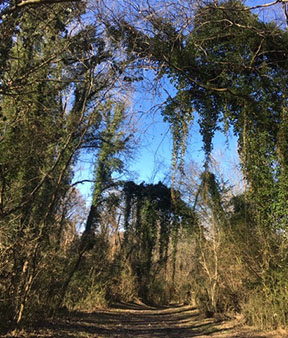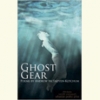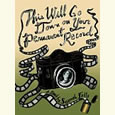Throwing Scissors
When safety feels like suffocation
When I was around 7 years old, I built a fort with a friend I’ll call Jenny.

Jenny was that friend. The one whose house we almost set on fire when trying to make a mustard-and-baking-soda cake in the microwave. The one who thought to turn my sandbox into a giant cauldron so we could brew potions out of bubble juice and crushed leaves to feed the troll that lived in my yard. The one who believed in Horse Elves — Tooth Fairy-esque creatures who could only be caught by making a trap out of a shoebox and a Milky Way bar — and made me believe, too. Everyone had that one friend, right?
When Jenny and I built the fort that night, we chose to use cardboard, a medium which came with its drawbacks: namely, the fact it kept out air. Or so we thought, for some reason. So naturally, we needed to make air holes. And naturally, the best way to do so was to throw scissors at the fort from across the room.
When Jenny began throwing scissors, I happened to be inside the fort. I remember the sound of the blades hitting the cardboard, the little craters they left behind, but I don’t remember feeling scared. I trusted my friend. I even trusted scissors; I had never been given a reason not to. All in all, I thought nothing of it, and I likely would never have — had my mother not walked in at a particularly inopportune moment, mid-scissor-throw.
I’m not sure what punishment my friend was given, if any, but mine was this: My mother stood me in front of her giant Dell desktop, pulled up Google Images, and searched “scissor wounds.”
I remember it was uncomfortable to look at the graphic search results, especially since I wasn’t even allowed to watch PG-13 movies at the time. But, again, I don’t remember feeling scared. For many of us, fear is something that only registers when a previously nebulous, hypothetical threat actually materializes on the horizon. When it finally grows close enough for us to know what it will feel like when it arrives at our feet.
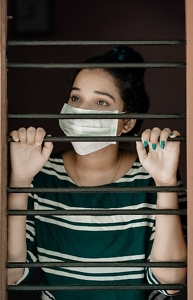
Two years ago, I was in a car crash. Up until that point, there had been a million moments where I had wondered if the car next to me was going to swerve into my lane, if the truck across the street was going to run the red light, if the biker to my right was going to cross over the white line. But each time, I reminded myself that it wasn’t going to happen. Each time, I kept driving, and it didn’t. The seconds before my accident, seeing the semi inch towards me in my side mirror, were no different: I refused to let myself imagine what being hit would feel like until I heard metal scraping against metal. Only then did fear pour in through the windows.
Luckily, on that night 11 or 12 years ago, my friend Jenny had good aim. The scissors never hit me, so I never had to imagine what it would feel like if they did. I couldn’t have, I don’t think, even if I had wanted to. No amount of WebMD images or Grey’s Anatomy screenshots could bring the potential pain into focus. I suppose my mother is different from me in this regard. She picks up on fear earlier: her ears perking up, her gaze zooming in. Maybe she is less afraid of fear than most of us; she goes to no lengths to avoid it. She lets it flood our house, and she floats in it. But in this way, she is never caught off guard. And, in this way, she is safe.
Recently, I’ve been thinking a lot about that fort and the scissors and my mother’s approach to ensuring my safety: feeding me little bits of what she hoped would taste like fear. All these years later, she still uses the same technique. And it still isn’t working.
I’m a rising sophomore at Amherst College, and our school has decided to allow first-years and sophomores back on campus for the fall semester — with a plethora of social distancing guidelines, Black Mirror-esque symptom self-reporting, mask-wearing requirements, and Prohibition-era rules barring alcohol. They’ve done pretty much everything in their power to create a safe campus, short of not having any students back at all — the decision my mother believes they should have made.
A side note: I feel self-conscious saying “my mother” so often — I’m in college; I’m 19. I’m not supposed to be pulling the parent card all the time. And yet, for me, it’s different.
Growing up with a single mother meant a dissolution of the typical parent-child boundary. Most decisions were unanimous, all factors and truths laid out on the table for us both to dissect and pore over. I’ve always been given a large amount of responsibility in exchange for, well, a large amount of responsibility. My mother has always been transparent with me, and I have always had to be transparent with her. For this reason, stupid decisions engendered more guilt in me than they did for many of my friends. Or at least a different kind of guilt. It felt like I was abusing my own power.
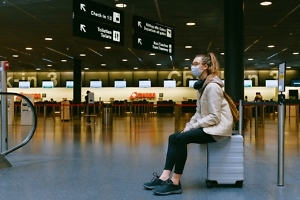
And now, our relationship makes it much more difficult for me to say, “I’m going to make my own decisions, and she can make hers; I’m an adult.” Because she never made decisions for me. Rather, she made them with me. Therefore, there is no need to knock over the throne, to force her out in order to take her place at the helm of my own life. I’ve always been there, the consequences of my own choices being thrown back in my face like spray off the sea.
So, when I cite my mother, it isn’t that she’s pulling rank. It’s just that she matters. Her opinion matters, just as much as mine. And so does her fear. Which is it why it frustrates her to no end that neither reading off the number of young adults catching COVID-19 nor showing me videos of patients on ventilators can provide me with the kind of fear I can really hold in my hands. The kind of fear that weighs enough to alter my course.
I wish I was scared of being sick; I wish we all were. But I’m not. We’re not. Not enough. I am, however, scared of my mother getting sick if I am under her roof, and I am scared of spreading the virus asymptomatically to others. So, I wear my mask and keep my 6-foot distance and go home when I need to use the bathroom to avoid stepping inside my friends’ houses. But I am not scared of being sick. And how can I justify tying one end of my mother’s fear around my neck and the other around our home, like an owner tying their dog up outside the grocery store, when it is not my own?
I am scared of returning to school for other reasons. I am scared of the unknowns and the emptiness and the distance. Of sterility replacing warmth. Of building a new home on a campus where vestiges of the home I had already built are strewn everywhere, none of them salvageable, due to the virus.
But maybe, like my mother, I am not as afraid of fear as I thought. Because, right now, every part of me wants a storm I can stand before. Wants a wind that will knock me over, just so I can remember how to stand back up. Haven’t we all grown tired of the calm waters, the dead air? Aren’t we all unsettled by the inertia of quarantine, brought about by something as violent as a pandemic?
So what if Jenny threw scissors that landed inches from my face? All I remember is not getting hurt. But I can’t know whether all I will remember from returning to campus is not getting sick. If fear catches up with me, by that point it will be too late. Yet, all those years ago, we only threw the scissors because we were worried that if we didn’t, we would suffocate.
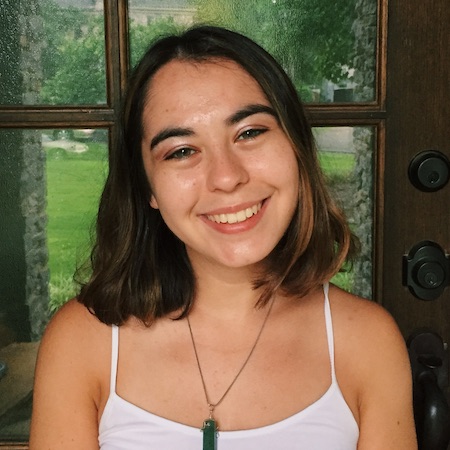
Copyright (c) 2020 by Bianca Sass. All rights reserved. Bianca Sass is an undergraduate at Amherst College and a former intern for Humanities Tennessee. Her writing has appeared in Pfeiffer University’s The Phoenix, and she is currently working on a novel. She is a Nashville native and Harpeth Hall graduate.
